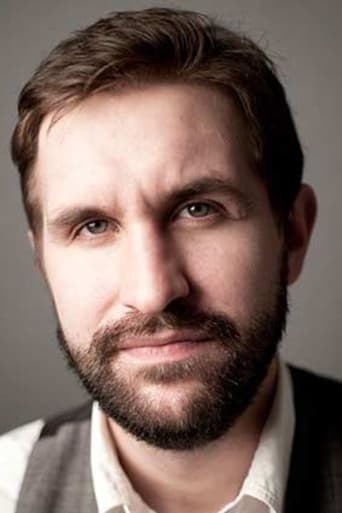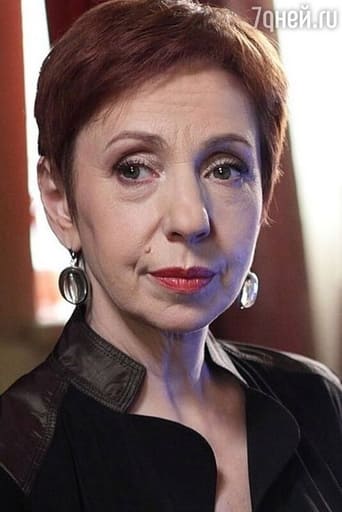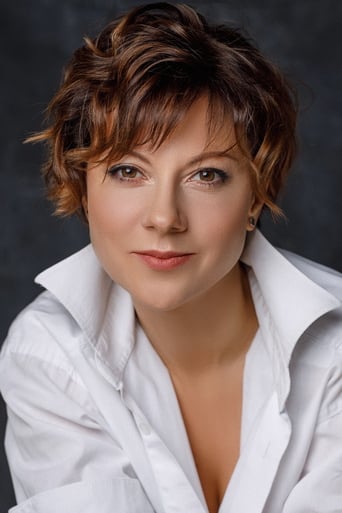jessy zaki
That's why i love European movies. they focus on the story, acting, cinematography; natural cinematography without usual Hollywood special effects and explosives, making you sigh after the end credits.
What is more beautiful than seeing the water and the blue sky, feeling the air on the way the actors feel it. Really, camera angles could make difference, making the audience in the seat of the actors. What I mean is apparent in the scenes where the children use their camera and view sights. You feel shaken hands while taking photos like you do, see the world like they see it around. It gets bothering at times these shaky hands, but it get you in the mood of the movie.
Concerning the acting, it's solid, and the two boys are superb. The movie does not contain much dialogue, so the actors depended on their facial expressions which they succeeded in having the right ones in every scene, expressing how they feel towards their father.
The plot is vague in some concerns and not everything is revealed. It is about the return of a father to his two children after 12 years. He took them in a journey to a deserted island.
What special about The Return is its various interpretations. It appeals to all countries and all ages according to your interpretation, whether it is politically, socially or even religiously. Believe me, you will find what concerns you in this powerful and flexible movie, realizing that The Return is more than the return of a father.
trancelucence
(NOTE: I read reviews here after viewing, and comments in the 'The Return does not have a full-filling end' thread, and left a couple of my own. This review builds on those, and observations made by hilaryjrp and bostonfilmfan).What life is all about, a haunting movie I won't soon forget. So riveting (with very little dialogue) I hardly noticed the subtitles. The action speaks for itself. It's highly suspenseful, and you haven't the faintest idea what's going to happen, yet also full of simple, quiet moments that bespeak volumes (AND mysteries) about the characters.The film is lyrical, poetic, almost subliminal, rather than "expository" (i.e., the payoff being in the journey, rather than the ultimate ending). Actually, lyricism and exposition are so expertly intertwined the film succeeds on BOTH levels. But be forewarned, it has disturbing events, it's no walk in the park- if you're a sensitive person that can't tolerate tragic or traumatic themes, this may not be your cup of tea. But I thought the ending was absolutely seminal to the experience- for both the characters and the VIEWER.This is the kind of movie rife with multiple possible meanings and interpretations, which invites repeat viewing. Moreover, you learn something about yourself in your reactions to what unfolds- what you pay attention to, expect, hope for... fear.***BIG SPOILERS FOLLOW AS PLOT, THEMES AND THE ENDING*** DON'T read further until you've seen the film if, like me you're the kind of person who thrives on discovery and surprise. Reading others' interpretations in advance will color your own, of course.In reviews and comments, some viewers decried the ending- some found it disturbing, others thought it, at the very least, unsatisfying. No, the film does not have a "satisfying" ending (seemingly, anyway, though perhaps there's a kind of symmetry to it), that was the POINT (art imitating life), I thought. The boys learn a terrible lesson. Wherever Dad had been, whether he was a nice guy or not, whether he intended to stick around, whether he planned to make up for lost time, whether they'd resolve issues and forge a relationship- as troubling as those dangling threads (symbolized by the mysterious contents of the box) may have been- they were infinitely better than what actually occurred. (Or WERE they??) Bring down the curtain on EVERYTHING where Dad is concerned. What a shock. Whether they had dreamed of reunion, hated his guts, been crushed by his desertion, yearned for him, whatever, there would now NEVER be a "satisfying ending", no-one would ever find out what the box contained.BUT, there was ALSO the theme of the younger boy's fear of life, of many things. He cried and told his mother at the beginning if she hadn't come he would've died. He threatens to kill himself by jumping off the tower- then, he sees death up close, for real, he's even partly responsible. Crash course in what death REALLY means. What an enigmatic film- note the pics/selfies of the brothers on the trip home (interspersed with the credits- STAY TUNED)- in some they're laughing, now seem lighter (dealt with something unspeakable, faced it with courage, were transformed by the experience? Both brothers change over the course of the film). Perhaps they're now FREE of the spectre of their father's desertion, and all the issues related thereto that have been hanging over their heads for 12 years (achieving a kind of closure). So perhaps the question is, did death represent being cheated of answers and what might have been, OR did it precipitate closure (albeit in a traumatic, kick-in-the-gut fashion)? Could BOTH be true? (Regret over what might have been and the need for closure are both integral parts of the grieving process.) One might even wonder if, all things considered, if Dad or "fate" or God didn't give the boys a gift- the ultimate sacrifice, so that they might begin life anew.In a nutshell, I think The Return is disconcerting because you think at its core it's about a relationship but it's actually about death and its ramifications. In I NEVER SANG FOR MY FATHER Gene Hackman said "Death ends a life, but it doesn't end a relationship." Or does it? Thematically and mood-wise this film reminded me a lot of a favorite film, Hayao Miyazaki's SPIRITED AWAT- at the beginning Chihiro, too, is negative, whiny and pretty much afraid of everything. While she doesn't face anything quite this bad, her parents will live or die as a result of her actions.And finally, the two brothers solidified their relationship on the trip, bonding as never before. Each became protective of the other when the father was unreasonable or harsh- at different points each threatened to kill him if he hurt the other. At the end the older boy assumed responsibility, never chiding his brother for what he had done, assuming the role of protective big brother or perhaps even "father". Contrast this with the way he treated his little brother at the beginning of the film.However one interprets the film, it appeared that both boys were honed, improved by events, and became closer (in this regard, in many ways, it reminds me of ORDINARY PEOPLE, which involves a death in the family and two people bonding at the expense of a third). LOTS to chew on in The Return! Highly affecting, and though harrowing at times, I thought it was wonderful, brilliant- a work of art.
Nick Maxwell
This slow-paced, introspective thriller of a coming-of-age story will leave you contemplative and stricken. The movie begins with a sweeping view of the sea floor, where we see a sunken ship (foreshadowing the film's ending). From there we're introduced to a group of adolescent boys leaping off of a tower and into the water. Ivan, a few years younger than the rest of the boys, is immobilized with fear, and it isn't until hours later that his mother is able to rescue him from his fears and coax him down the tower. Later, after a fight with his brother Andrei (presumably Ivan's only link to the other boys), Ivan is surprised to find that his absent father of twelve years has finally returned home for reasons left ambiguous. Ivan more than his brother Andrei is wary of his father and challenging of his role as a parent as the three embark what is supposed to be short trip camping. Throughout the trip, Ivan is emotionally distant. We're treated to his point of view as he gazes at the natural scenery of the road in a moment where Zvyagintsev works Ivan's character into his cinematographic style. We're able to empathize with both brothers, as Andrei is quick to accept his newfound father that never was and Ivan is closed off emotionally and slow to accept someone who didn't need him for 12 years back into his life. There are no firm lines drawn by Zvyagintsev, no character is portrayed irrationally or unrealistically. Later, after a night in tents where Ivan is brought to tears from his father's harsh ways and the overall gravity of him returning after all this time, the father announces that the two will be traveling further. The brothers are made to row a wooden boat to a far off deserted island for no discernible reason, where the last act of the film takes place. Here the father teaches the two about survival. He leaves the two momentarily to unearth a mysterious metal box (an object evocative of Tarkovsky's room in "Stalker" due to its unexplained significance and shroud of ambiguity). After the two brothers take a prolonged voyage exploring a nearby abandoned ship, Andrey is confronted by his father for spending hours with their wooden boat, and for the first time his cold discipline manifests itself into physical violence as he slaps Andrey as he tries to pin the blame on his brother. It's then that Ivan reveals to his father that he had stolen his knife while he was off digging up the box, and threatens him with it before running off into the woods. Ivan flees to the top of a tower, where he claims he'll jump if his father doesn't leave him. Trying to circumnavigate the door to the roof that Ivan locked in his flight, the father climbs the side of the tower and says "Ivan, my son" before the plank of wood he was held onto breaks and he's sent hurdling to his immediate death. The two drag his body back to the boat and row it to the mainland. It's then that the boat begins to sink and Ivan screams "Papa!" as the body lowers into its final resting place. This is the first instance where we see Ivan using a paternal pronoun towards his father, and it can be concluded that the father's tragic display of love for his son is what it took for Ivan to accept him. Perhaps in another film, the father would have successfully ascended the tower and hugged Ivan like his mother did at the beginning. The last we see is a montage of photographs taken by the boys of each other along the course of their journey. The complex, multilateral approach to a father-son relationship that Zvyagintsev takes in this film rebukes cliché and creates a definitive signature that will stick with you. This film separates itself and demands your attention long after the credits roll. While it may be seen as only barely palatable due to its pacing and lack of substantive events that would string along an audience in a more attention-craved film, "The Return" will intrigue you and make you think more than would otherwise be possible.
Gordon-11
This film is about two boys who meets their father for the first time in twelve years, as their father arrives home unannounced."The Return" explores the relationship between the father and their two boys, who haven't met in twelve years. The pace is slow, but it is engaging because of the dynamics between the characters. The father arrives home and then goes onto a trip with their children, much to the mystery of the boys and also the viewers. The mysterious circumstances continue, creating suspense as viewers hope for closure. The characters and the dynamics between them are interesting as well.The younger son, Ivan stands out because he is the strong willed and bossy one. His emotions take a U-turn at the end, yet it is only briefly portrayed on the screen. The director might have left the emotions unsaid, as a picture is worth more than a thousand words. Still, I would have liked a bit more screen time for the younger son and the viewers to feel the emotions.





